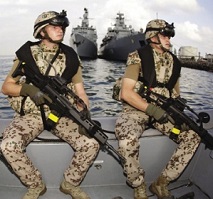
Syria: The Need for Negotiated Peace Efforts
Many recent events have slowed Washington’s rush to war against Syria. The time gained must be used wisely to create a renewed negotiated peace effort.

Many recent events have slowed Washington’s rush to war against Syria. The time gained must be used wisely to create a renewed negotiated peace effort.

Pirate hijackings off the coast of Africa have spawned a lucrative protection industry. With private security guards taking to the oceans in ever increasing numbers, is this really the way to safer seas?

"Honduras has been known for two things only: being a military base for the [contra] attacks on the Nicaraguan revolution, and Hurricane Mitch." - Berta Caceres, co-founder and general coordinator of the Civic Council of Popular and Indigenous Organizations of Honduras.

Source: The Independent
The discredited justifications that preceded the invasion of Iraq still dominate British and American perception of military intervention in Syria. In a similar way in the 1930s, popular revulsion at the lies and exaggerations of First World War propaganda meant that the first accounts of Nazi atrocities were treated with scepticism.
Unsurprisingly, people who feel they were swindled into war 10 years ago by bloodcurdling accounts of Saddam Hussein’s non-existent weapons of mass destruction are dubious about their government’s claim that President Bashar al-Assad’s army used poison gas on a mass scale on 21 August. All the questions that should have been asked in 2003 about Iraq are being asked about Syria: what is the evidence for chemical weapons? How partial are the sources of information? Why should Assad do something so much against his own interests? Would a limited air assault on Syrian military bases deter him from using chemical weapons again, supposing he used them this time, or would it be the first step towards ever-deeper British and American involvement in the war?

Source: The Guardian
All the signs are they’re going to do it again. The attack on Syria now being planned by the US and its allies will be the ninth direct western military intervention in an Arab or Muslim country in 15 years. Depending how you cut the cake, the looming bombardment follows onslaughts on Sudan, Afghanistan, Iraq, Libya and Mali, as well as a string of murderous drone assaults on Yemen, Somalia and Pakistan.
The two former colonial powers that carved up the Middle East between them, Britain and France, are as ever chafing for a slice of the action as the US assembles yet another “coalition of the willing”. And as in Iraq and Sudan (where President Clinton ordered an attack on a pharmaceuticals factory in retaliation for an al-Qaida bombing), intelligence about weapons of mass destruction is once again at the centre of the case being made for a western missile strike.

Recently fast-food workers have forced the issue of their low-paying jobs into the public spotlight with what has been called the largest strike by fast-food workers in US history. In the process of making demands for livable wages, fast-food strikers are challenging customers to consider the lives of the human beings behind the counters.
Copyright Toward Freedom 2019